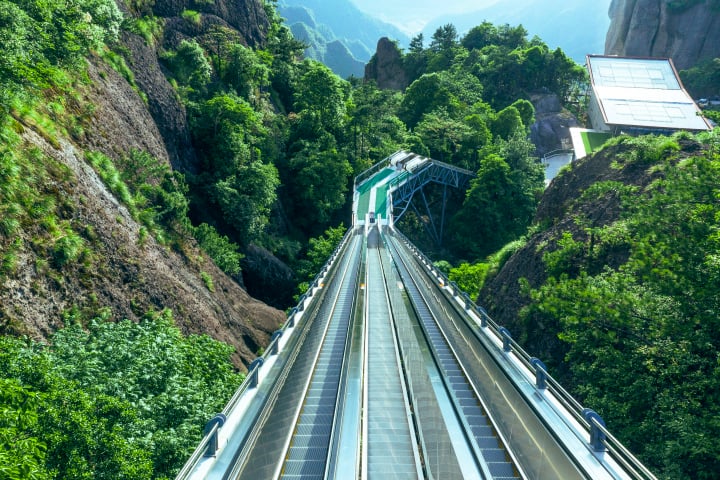In a bid to get people to take climate change more seriously, Italian adventurer Alex Bellini is going to live on an iceberg until it melts. He plans to take on the challenge in the spring of 2015, on an iceberg in Greenland. He expects that he’ll have to live there alone for at least eight to twelve months.
Alex, who is now based in the UK, plans to live inside a survival capsule while on the iceberg. “Survival capsules are sort of floating Kevlar saucers, four meters in diameter, which are used as lifeboats on oil platforms,” he explained. “I will live in the capsule on the iceberg until it melts – which generally happens within eight months – or up to a maximum of one year.”
“Then, I’ll go adrift in the Atlantic Ocean, inside my capsule again, until I wash ashore.” He plans to carry 300 kilos of dehydrated food and electronic equipment along with him. Although he is yet to pick the perfect iceberg to live on, he said it would most probably be broad and flat, about 60 by 20 meters.
Photo: Alex Bellini
“My objective is reporting and investigating, by means of scientific methods, the entire lifetime of an iceberg,” he added. “I want to prove how the pace of ice-melting has dramatically accelerated over the last decades. We’ll also play the symbolic card: the adventure of a man floating adrift on an iceberg will come to represent the condition of the whole humankind going adrift on an endangered planet.”
Alex is a former banker who gave up his cushy job in the early 2000s for a life of uncertainty and adventure. Since then, he has run over 23,000 kilometers in marathons, and rowed across the Mediterranean Sea, the Atlantic Ocean and the Pacific Ocean. But his current project is his most ambitious one yet, and riskier than anything he has ever tried before.
Photo: VICE Motherboard
“Yes, probably I’m a bit crazy,” he admitted. “On the iceberg, I will be generally alone, but for short periods of time I will be meeting with writers, bloggers, environmentalists. We are all aware of the risks I will potentially be facing, but part of the adventurer’s job is also risk managing. When the iceberg will be too small to keep me on its ‘back’, I will use my survival shelter as a life raft with which I’ll go adrift and I’ll then wait to be picked up and rescued.”
“The North Atlantic is a very busy area and I expect to stay at sea up to 7 to 10 days,” he added.
Alex said that he’s also treating the iceberg project as an opportunity to experiment with new technologies. “I’m thinking about communication technologies, which I will use to keep in touch with my family and my team, but also energy technologies. For example, my technical equipment will be powered by a rowing machine that will convert my muscular energy into electricity,” he explained.
Photo: Alex Bellini
Funnily enough, his survival capsule doesn’t come with a toilet of its own. “Nope, I’ll use a bucket for that,” he laughed. “It’s funny, it has taken me a bit to realize that the bucket is the best pooing device. When I was crossing the Atlantic, at first I tried to poo jutting out my butt from the boat. Problem was that, when the sea was rough, it kept throwing the stuff back into the boat. At some point I started using the bucket and it worked nicely.”
Although his project sounds incredibly exciting, there are bound to be periods of boredom when he’s stuck all by himself on a piece of ice in the middle of the ocean. But Alex is prepared for all such scenarios. “It will be challenging, since there won’t be any significant physical effort involved in this adventure,” he admitted. “I’ll take something to read, of course. In addition, my wife and I enrolled in the psychology program of an online university, so we’ll try to study ‘together’ via the internet.”
Photo: Alex Bellini
Incidentally, Alex’s family seems to be quite comfortable with what he’s planning to do. “We talk about the project every day, and my wife is the coordinator of the team,” he said. “We can say that it’s a family business. Both my daughters know that I will live for a few months on an iceberg to draw the world’s attention on environmental issues. When I told her, the elder (4 years old) replied: ‘It’s an important thing, Dad.’”
Alex said that he was inspired to choose the iceberg project from his study of history. “One of the characters I admire the most, a man who left his mark on the history of the last century, is Umberto Nobile,” he said. “He famously made a journey to the North Pole in 1928, in which he survived for 48 days on the pack with eight other team members. He inspired me.”
Alex has a lot of advice to give to people who want to become adventurers themselves: “Life is like a pendulum: the higher you lift your ambitions, your commitment, the difficulties you’re ready to go through, the higher the reward you’ll get.” True, that!
Sources: VICE Motherboard, Adventure-Journal










